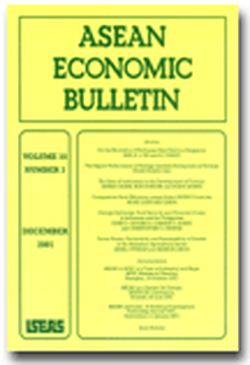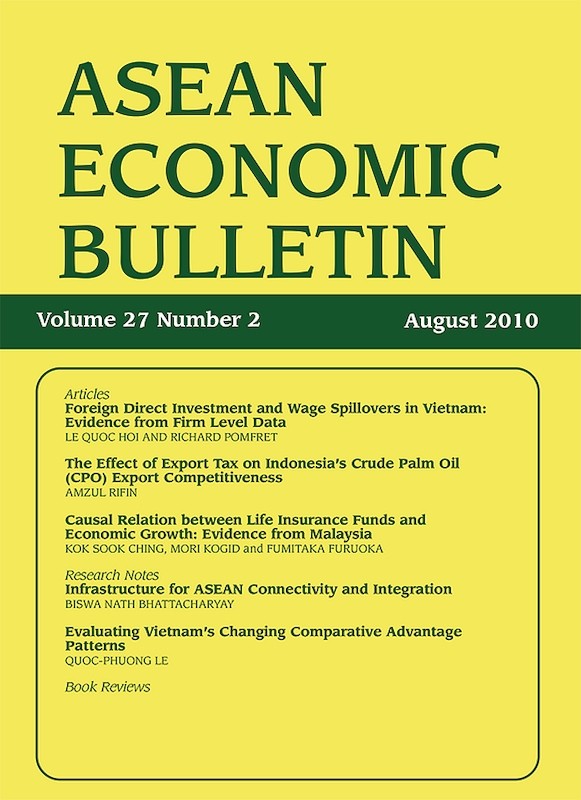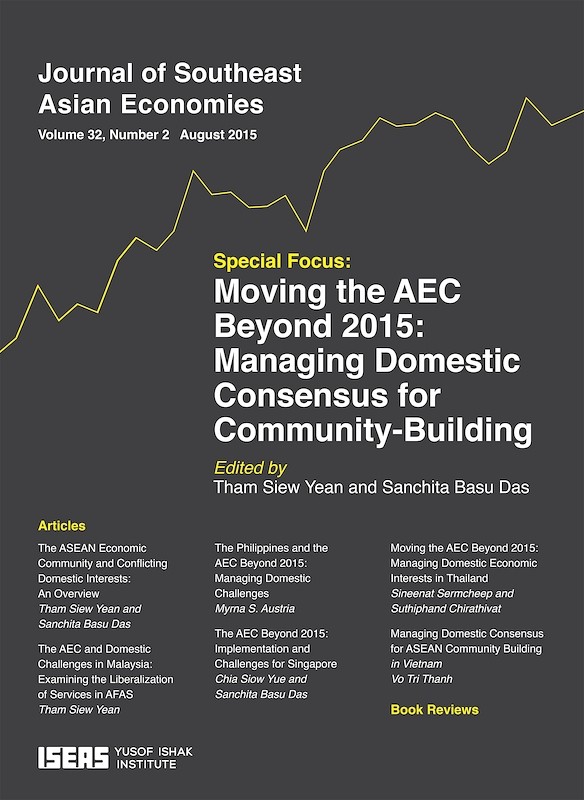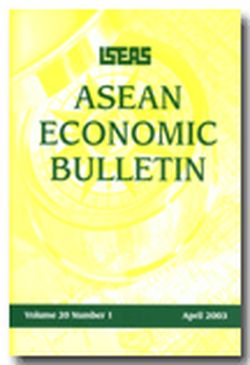ASEAN Economic Bulletin Vol. 23/3 (Dec 2006)
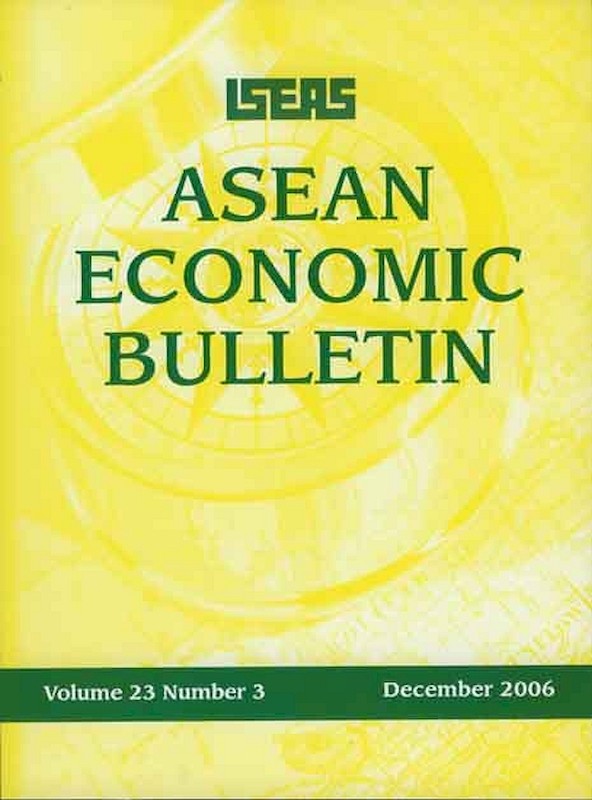
Date of publication:
December 2006
Number of pages:
124
Code:
AE23/3
Contents
-
ASEAN Economic Bulletin Vol. 23/3 (Dec 2006)
-
Preliminary pages
- ARTICLES
-
Poverty and Growth in Southeast Asia, by Peter Warr, author see abstractOver recent decades, most countries of Southeast Asia achieved reductions in absolute poverty incidence, but these reductions varied in magnitude between countries and over time. This paper shows that differences in the rate and sectoral composition of economic growth explain part, but not all, of these differences. It describes outcomes on poverty incidence in Southeast Asia and relates them to the growth of output in the agricultural, industrial, and services sectors. This analysis uses data from the 1970s to the most recent available for Indonesia, Thailand, Malaysia, and the Philippines to analyse the economic determinants of changes in poverty incidence in Southeast Asia.
-
Technological Development and Economic Growth in Indonesia and Thailand since 1950, by Ewout Frankema, J Thomas Lindblad, authors see abstractThis paper compares long-run economic growth in Indonesia and Thailand as related to technological progress during the second half of the twentieth century. It adopts a two-stage approach. It first provides an estimation of long-run total factor productivity differentials between the two countries then offering an in-depth analysis of this differential and associated trends and policies concerning, amongst others, capital goods imports, foreign direct investment and R&D expenditure. The paper argues that technological progress shaped by official policies and the institutional framework of absorption sufficiently explains why outcomes have differed so substantially in Thailand and Indonesia despite apparently similar initial conditions of long-run economic growth. Macroeconomic policies need to pay explicit attention to the acquisition of modern technologies in order for rapid economic growth to be sustained.
-
The Degree of Competition in the Thai Banking Industry Before and After the East Asian Crisis, by Koji Kubo, author see abstractThis paper analyses the influence of the East Asian crisis and the subsequent reforms on the oligopolistic nature of the Thai banking industry. Since the crisis, there have been substantial changes in competitive environment, including a decline in the family ownership of banks as well as the arrival of new entrants. How did these changes affect a banking industry in which the six largest local banks accounted for over 70 per cent of market share? The estimated Lerner index from Bresnahan's (1989) conjectural variation model indicates the possibility of a decline in the degree of competition.
-
Policies Affecting Indonesia's Industrial Technology Development, by Thee Kian Wie, author see abstractThe competitive environment for Indonesia's manufacturing industries has changed a great deal in the years following the Asian economic crisis. The major factors in the global environment that have adversely affected Indonesia's competitiveness in its manufactured exports include increasing economic openness, shorter product cycles, and continuous technological improvements. It is vital for Indonesia to monitor regularly the productivity and international competitiveness of its industries. Other major factors that have adversely affected or may adversely affect the competitiveness of Indonesia's manufacturing industries are China's rise as a formidable competitor in the world markets for manufactured exports and as an attractive host country for foreign direct investment (FDI); the emergence of global contract manufacturers in Singapore, Malaysia, and Thailand; the expiry of the Multi-Fibre Agreement (MFA) in early 2005; trade liberalization within the ASEAN countries; and the WTO-mandated reduction in tariff barriers. This paper discusses Indonesia's low industrial competitiveness and the steps which could be taken to remedy this problem.
-
The Link between Firm Characteristics, Bribery, and Illegal Logging in Indonesian Wood-based Industries, by Budy Resosudarmo, Nina I L Subiman, authors see abstractIllegal logging is one of the major causes of deforestation in many parts of the world. Frequently, this illegal activity goes hand in hand with bribery and corruption. This paper examines wood-based firms characteristics to determine the likelihood of their involvement in bribery and illegal logging in Indonesia. It adopts the Gary Becker's model of crime to develop a firm demand function of illegally harvested logs. The firm-level data set available from the Indonesian Central Statistics Agency is used to estimate this demand function.
-
Reconstruction of the Service Sector in the National Accounts of Indonesia, 1900-2000: Concepts and Methods, by Daan Marks, author see abstractThe study of the modern economic history of Indonesia, covering the period from the beginning of the twentieth century until the present day, has so far been less systematic than what the available source material would permit. Indonesia is exceptionally well endowed with rich statistical sources, especially with regard to the late colonial period with the potential of supporting a rigorous and systematic quantitative approach to vital questions concerning long-run economic growth performance. The gap between current historiography and available sources needs to be bridged by an appropriate methodological framework and a rigorous analysis. Such a methodological framework is provided by the reconstruction of the national accounts of Indonesia. This paper discusses the case of the service sector in the reconstruction of the national accounts of Indonesia throughout the twentieth century. Its aim is to explore methodological possibilities and bottlenecks with regard to the reconstruction of income generated by this important sector.
- BOOK REVIEWS
-
BOOK REVIEW: The New Development Economics: After the Washington Consensus, edited by Jomo K. S. and Ben Fine., by Francis E Hutchinson, author
-
BOOK REVIEW: The Dimensions of Regional Trade Integration in Southeast Asia, by Mohammed Zakirul Hafez, by Jamus Jerome Lim, author
-
BOOK REVIEW: Sustaining Competitiveness in the New Global Economy, edited by Ramkishen S. Rajan, by Chang Chiou Yi, author
-
BOOK REVIEW: Managing FDI in a Globalizing Economy, edited by Douglas H. Brooks and Hal Hill, by Robert L Curry, Jr., author
-
BOOK REVIEW: Implementing Codes of Conduct: How Businesses Manage Social Performance in Global Supply Chains, by Ivanka Mamic, by Benjamin Loh, author

